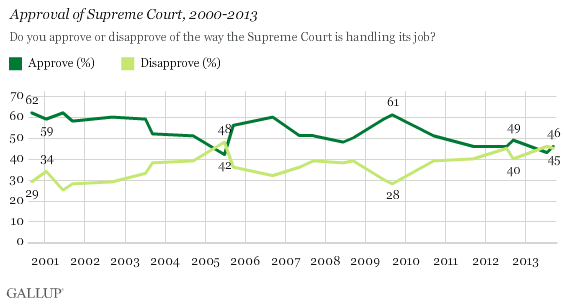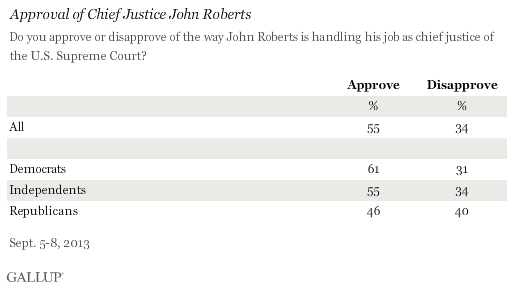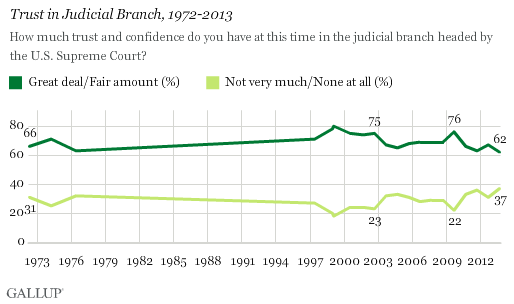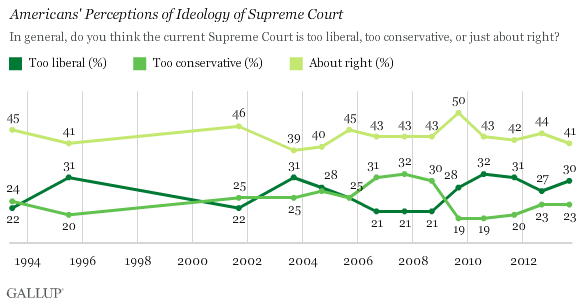WASHINGTON, D.C. -- Americans remain closely divided in their views of the performance of the U.S. Supreme Court -- perhaps reflecting the string of recent polarized court decisions. Forty-six percent of Americans approve of the way the Supreme Court is handling its job, while 45% disapprove. These figures are essentially unchanged from July 2013 polling, conducted just as the high court was wrapping up its landmark 2012-2013 term.

These findings come from Gallup's annual Governance poll conducted on Sept. 5-8, ahead of the Supreme Court's new term, which starts Oct. 7. While Americans have generally given the nation's top court has a strong approval rating and an overall net positive rating through the years, the percentage approving of the court has fallen below the majority level in the five polls Gallup has conducted since 2011. This sustained drop in the court's approval rating suggests it is not immune to the polarizing factors that have caused Americans' approval of the presidency and Congress -- and their trust in government more generally -- to decline in recent years.
Americans Rate Roberts Better Than Court in General
The Supreme Court's leader, Chief Justice John Roberts, enjoys a higher approval rating than the court itself, at 55%. This is up slightly from July 2010, when slightly less than half (48%) of Americans approved of the job he was doing. Roberts also boasts an approval rating 10 percentage points higher than President Barack Obama receives in the same poll.

Notably, Democrats are more likely to approve of Roberts (61%) than are Republicans (46%), perhaps a lingering effect of Roberts' key vote last year that upheld pivotal provisions of the Affordable Care Act. By contrast, in 2010, 51% of Republicans and 45% of Democrats approved of Roberts.
Americans Have High Trust in Supreme Court; Many See Its Tilt as "About Right"
Somewhat paradoxically, more than six in 10 Americans have a "great deal" or "fair amount" of trust in the judicial branch of the federal government, which of course is headed by the Supreme Court. Still, this is somewhat lower than the historical average of 70% dating back to 1972, but is higher compared with Americans' confidence in the legislative (34%) and executive (51%) branches.

Furthermore, a plurality of Americans (41%) believe the Supreme Court is ideologically "just about right." Fewer say it is "too liberal" or "too conservative." Three in 10 Americans -- including 55% of Republicans -- believe the high court, a majority of whose members were appointed by Republican presidents, is too liberal. That could be because Americans are evaluating the court's ideology in regard to President Obama, who has appointed the last two justices, although both replaced liberal-leaning justices and did not change the court's overall ideological thrust. Meanwhile, 23% of Americans believe the court is too conservative.

Implications
The U.S. Supreme Court continues to suffer from a middling approval rating, which represents a true change in Americans' attitudes since the turn of the century. Despite contentious rulings in the past, such as the 2000 Bush v. Gore judgment that handed the presidency to George W. Bush, the loser of the popular vote, the court's approval has normally rebounded from episodic moments of unpopularity.
Nonetheless, most Americans believe the judicial branch is the nation's most trustworthy division of the federal government. And even a plurality of Americans believe the court is ideologically balanced, rather than being too conservative or too liberal. For a court looking to start a fresh term, these are hopeful signs that it may one day be back in the good graces of a majority of the country.
Survey Methods
Results for this Gallup poll are based on telephone interviews conducted Sept. 5-8, 2013, on the Gallup Daily tracking survey, with a random sample of 1,510 adults, aged 18 and older, living in all 50 U.S. states and the District of Columbia.
For results based on the total sample of national adults, one can say with 95% confidence that the margin of sampling error is ±3 percentage points.
Interviews are conducted with respondents on landline telephones and cellular phones, with interviews conducted in Spanish for respondents who are primarily Spanish-speaking. Each sample of national adults includes a minimum quota of 50% cellphone respondents and 50% landline respondents, with additional minimum quotas by region. Landline and cell telephone numbers are selected using random-digit-dial methods. Landline respondents are chosen at random within each household on the basis of which member had the most recent birthday.
Samples are weighted to correct for unequal selection probability, nonresponse, and double coverage of landline and cell users in the two sampling frames. They are also weighted to match the national demographics of gender, age, race, Hispanic ethnicity, education, region, population density, and phone status (cellphone only/landline only/both, and cellphone mostly). Demographic weighting targets are based on the March 2012 Current Population Survey figures for the aged 18 and older U.S. population. Phone status targets are based on the July-December 2011 National Health Interview Survey. Population density targets are based on the 2010 census. All reported margins of sampling error include the computed design effects for weighting.
In addition to sampling error, question wording and practical difficulties in conducting surveys can introduce error or bias into the findings of public opinion polls.
View methodology, full question results, and trend data. .
For more details on Gallup's polling methodology, visit www.gallup.com.
